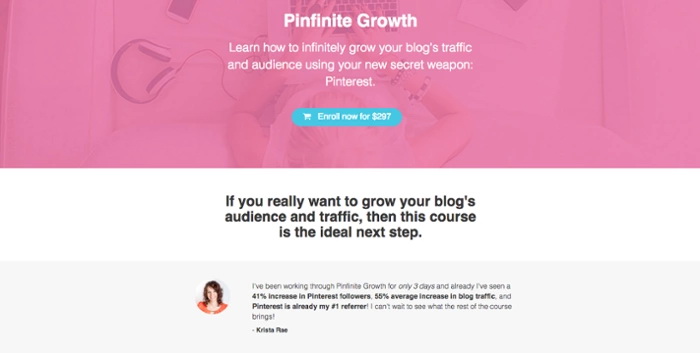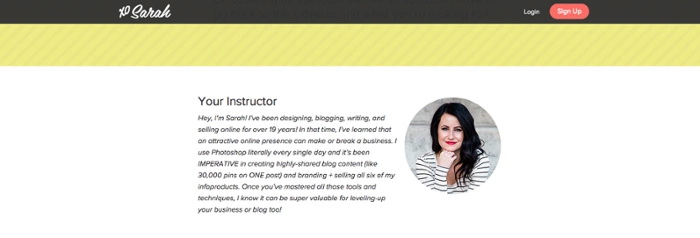How to optimize your sales page for conversions


Your sales page can act as the tipping point for customers considering buying your online course. A well-executed sales page converts significantly better than one thrown together during a rush job.
Taking the time to give your sales page the TLC it deserves can make the difference between students deciding to purchase or clicking away and forgetting about your course altogether. You might think, “Well, I got them to my sales page. The rest is out of my hands.”
But that’s where you’re wrong.
Your sales page is where students make up their mind. It’s where they decide whether or not your course is worth parting with their hard earned money for. And it’s your job to convince them it is.
How can you do that?
By adding “extras” to your sales page that help gain your audience’s trust and shift their psyche. These extras can be testimonials, a video from you, proof of transformations you’ve helped facilitate, or anything in between.
Social proof
The number one way to influence people to do something is peer pressure. No, really. That’s exactly what social proof is and it works. You influence people to buy by showing them that other people have bought and loved what you had to offer.
One way to establish social proof? Testimonials
Even if you’re launching your course for the first time, you can collect testimonials from people you’ve worked with in the past.
For example, if you’re already a coach you can reach out to your clients and ask for testimonials. Even if they haven’t taken your online course yet. They can vouch for you and your expertise. But be sure to make it clear that they’re vouching for a different service of yours. Slapping a testimonial for your coaching on a course sales page and implying it’s for the course can land you in hot water.
You can offer your course to a select group for very cheap. Or at a steep discount before you go live in exchange for their testimonials. This allows you to get your course in front of your audience.
Example: Pinfinite Growth by Melyssa Giffin


Another form of social proof is a money-back guarantee
The one thing that ensures we won’t buy a digital product? A lack of a return policy or money back guarantee.
When you’re shopping for a product in the store you can hold it, see it for yourself, and really understand what it is your product is going to do.
Online there can be a lot of blurred lines. Someone developed one set of expectations on what your course may be only to find that it’s something entirely different. A money back guarantee helps ensure people aren’t left in a bind and out a few hundred dollars.
True story
A friend of ours made a blogging course that she sold for $300. After her launch, she’d had around 25 students. Only one person requested a refund saying the content’s great but she didn’t realize the course was aimed at beginners and everything was a bit too simple for her. The refunded student promoted our friend’s course just once to her email list because she felt bad about asking for a refund but appreciated that one was granted. That one email made her 13 additional sales or nearly $4000. Offering a refund might mean losing out on one sale, but the goodwill it brings can more than make up for that.
For more examples of how you can use social proof to increase conversion rates, check out this blog post.
Introduction video
People are consuming more video than ever before and that’s not about to change.
The draw to video is that it helps your audience feel a greater connection to you. Taking a few extra minutes to sit down and record a video introducing yourself and your course is vital. You gain more trust from your audience.
Putting a friendly face behind your product puts your customers at ease and humanize your brand. This doesn’t have to be a super professional or polished video. Do be aware of your background and make sure the sound and image are clear. This gives your audience an idea of what kind of quality to expect in your course.
In this video, you’re going to want to use benefit driven language to let your customers know why your course is the one they should take. Tell them why you’re an instructor worth trusting.
A sample script might look like this
“Just one year ago that I lost my job and needed to come up with a new source of income. Quick. The few jobs hiring in my area would have required me to uproot my family and relocate. I wasn’t interested in just taking the first job I could find.
I started researching ways to make money online and found Etsy. I’ve always had a knack for crafts and figured it was worth trying. As a result, I took the plunge and got my site live. Four weeks later and every single one of my products had a waiting list. Six months later and I had doubled the income I made at my 9-5 and I had to bring on a full-time assistant.
Now, the only thing I’m more passionate about than running my business is helping others find the same freedom that I have. I want to help you go from 0 to Successful Etsy Store. I have the knowledge and experiences to do so.
If you’re looking to replace your income by selling on Etsy this is the best course for you.
Your sales page is the final checkpoint before students make their decision. Make sure that yours stands out with our free “sales page checklist.” Did we mention it’s free?
Author bio
Like the video, your author bio gives your audience a better insight into who you are and why they should trust you.
Writing bio’s and about me pages is always awkward, and if it ever gets easier we haven’t gotten to that point yet. But it’s important so it’s something we all have to power through.
Example: An XO Guide to Photoshop by XO Sarah (Sarah Morgan)


Also, your author bio gives your audience an idea of who you are and why you should be trusted. For example, if you create an online course on writing sales pages your author bio might look something like this:
“Hey there! My name is Morgan and I’m a blogger and a content marketer passionate about copy and conversions. I’ve been interested in online marketing since I was a teenager, and have done it full-time for over a year. I’ve seen hundreds (if not thousands!) of sales pages in my day and written a fair share, too. With that, I’ve learned what works and what doesn’t, and how to make the smallest tweaks to send sales through the roof.”
FAQ
The time and energy you put into your FAQ can save you a ton of time and energy down the line. For example, when your sales page goes live and people are deciding whether or not to bite the bullet and buy they’re going to have questions.
You can either answer them up front on your sales page or respond to email after email addressing the questions your audience is inevitably going to have.
A few common questions you’re going to want to address:
-
Who is this course for?
You can’t be everything for everyone (no matter how much you try) and this is your chance to narrow down who your course is actually for. It might feel weird telling people that your course might not be for them, but it’s going to save you the hassle of disappointed students down the line when they realize your course isn’t for them after they’ve bought. Be sure to be clear here. Clarify what skills your students should already have and what you’re going to teach them. Tell them what supplies or programs they’ll need before getting started and make sure they’re aware of any prerequisites they need before taking your course.
-
What if the course doesn’t meet my expectations?
We highly recommend all courses have a 30-day money back guarantee. This gives your students a sense of security because at the end of the day they don’t really know you and as far as they’re concerned you could be catfishing them into believing you’re an expert and selling them a shoddy course. Now we know that’s not the case, but put yourself in a buyer’s shoes. If you’re looking to buy an online product from someone online and there is no return period or satisfaction guarantee that might bring you to the “What are they hiding?” mindset. Overall, we find that very few people ask for refunds, and those who do are more often than not doing so because they misunderstood the offer.
-
When does the course begin and end?
Here you can define how the course is formatted. Some courses are evergreen and can start the moment your student purchases while others have a set start and end date with content dripped out in between. Lastly, make sure your audience is aware of the format before they buy in order to avoid any confusion.
All in all, if you are interested in learning more about taking your sales page to the next level, check out how you can supercharge your sales page with custom blocks.
